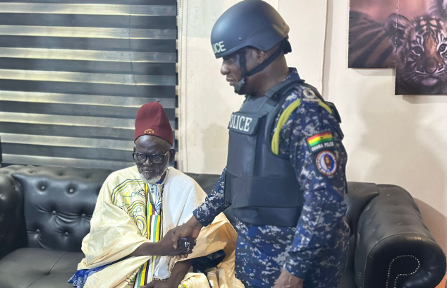The protracted conflict in Bawku, a town in the Upper East Region of Ghana, has been a persistent source of instability, hindering development and fostering an atmosphere of fear and distrust. However, a recent visit by Inspector-General of Police (IGP) Christian Tetteh Yohuno has been hailed as a significant step towards peace and reconciliation. This visit, coupled with the subsequent endorsement of the IGP’s actions by the Kusaug Traditional Council led by the Bawku Naba, Zug-Raan Asigri Abugrago Azoka II, offers a glimmer of hope for a future free from violence and division. The IGP’s commitment to transparency and accountability in investigating recent disturbances, including a fatality and several injuries, appears to have resonated deeply with the local community, signalling a potential shift towards collaborative peacebuilding.
The Kusaug Traditional Council’s public commendation of the IGP is remarkable not only for its rarity but also for its explicit acknowledgement of the IGP’s commitment to transparency and justice. The Council’s statement, signed by its secretary, Mr. David Adoliba, emphasized the symbolic importance of the IGP’s visit, interpreting it as a demonstration of genuine concern for the plight of the people of Bawku and a desire to restore order and trust in the community. This acknowledgment of the IGP’s efforts is a critical step in rebuilding the often-strained relationship between the community and law enforcement, paving the way for increased cooperation and effective security measures.
The Bawku Naba’s consistent advocacy for peace and dialogue has been a beacon of hope amidst the ongoing conflict. His call for calm among the youth, coupled with his urging for trust in the justice system, is a clear message of his commitment to resolving the tensions through peaceful means. The Kusaug Traditional Council, echoing the Bawku Naba’s sentiments, emphasized the necessity of collective action and meaningful dialogue to address the underlying causes of the conflict and achieve lasting peace. This shared vision of a peaceful future, articulated by both the traditional authority and the head of the national police force, creates a powerful synergy for positive change.
In a significant gesture of confidence in the state security apparatus, the Kusaug Traditional Council appealed to the IGP to redeploy police personnel to the municipality. This request, coming after years of strained relations and mutual suspicion between some community segments and law enforcement, signals a crucial shift towards collaboration and a shared commitment to restoring normalcy. The council’s endorsement of the resumption of regular police duties is a testament to the trust they have placed in the IGP and the Ghana Police Service under his leadership. It represents a collective desire to move beyond the cycle of violence and embrace a future of peace and security.
The Kusaug Traditional Council’s statement is not merely a polite acknowledgement of the IGP’s visit; it is a comprehensive endorsement of his vision for inclusive peacebuilding. The Council’s call for all parties to prioritize peace and unity reflects a deep understanding of the devastating impact of the conflict on the community. By echoing the IGP’s emphasis on collective action and constructive dialogue, the Council underscores the importance of shared responsibility in resolving the conflict and restoring stability to Bawku. The statement serves as a clarion call for unity and cooperation, encouraging all stakeholders to work together towards a common goal of lasting peace.
The alliance between traditional authority and security leadership in Bawku holds immense potential for lasting change. The Bawku Naba’s endorsement of IGP Yohuno, combined with the Council’s public commitment to peace and its call for renewed police presence, creates a powerful framework for moving forward. This collaborative approach to peacebuilding, with its emphasis on dialogue, transparency, and accountability, could serve as a model for other conflict-ridden areas in Ghana. The success of this collaboration will depend on sustained effort, continued dialogue, and a genuine commitment from all stakeholders to embrace peace and reject violence. The events in Bawku provide a glimmer of hope that a future free from conflict is within reach, if the current momentum towards peace and reconciliation can be sustained.














